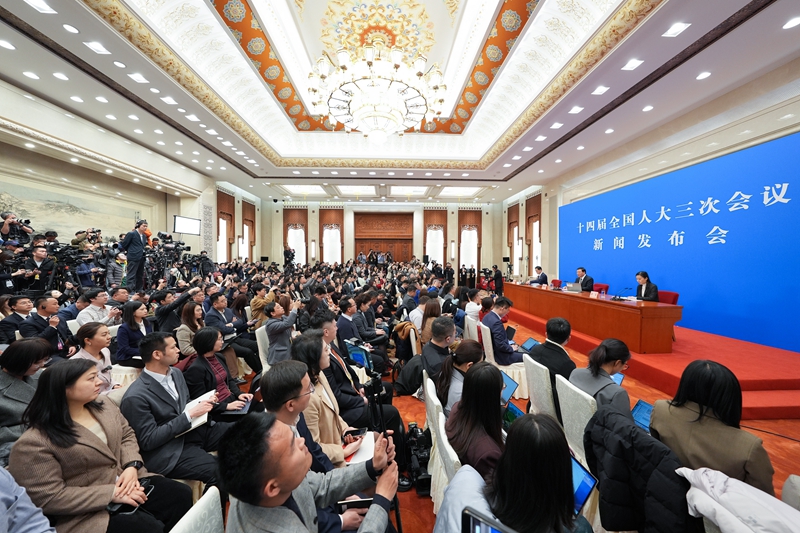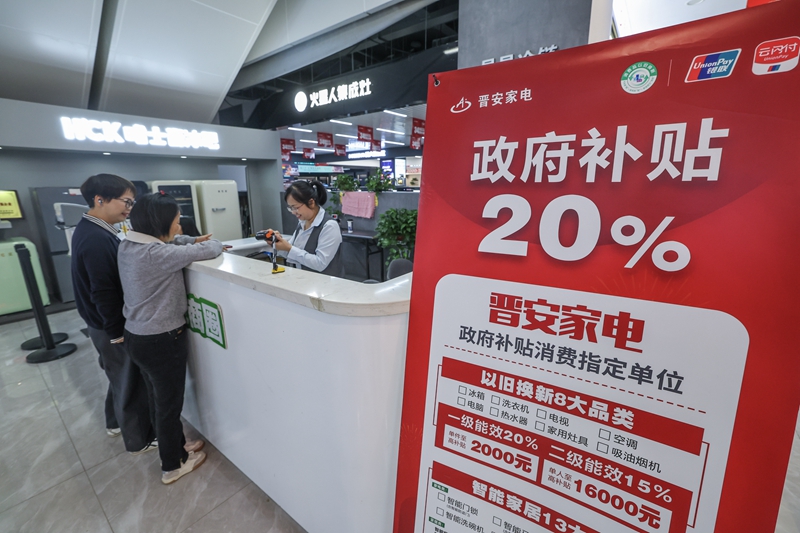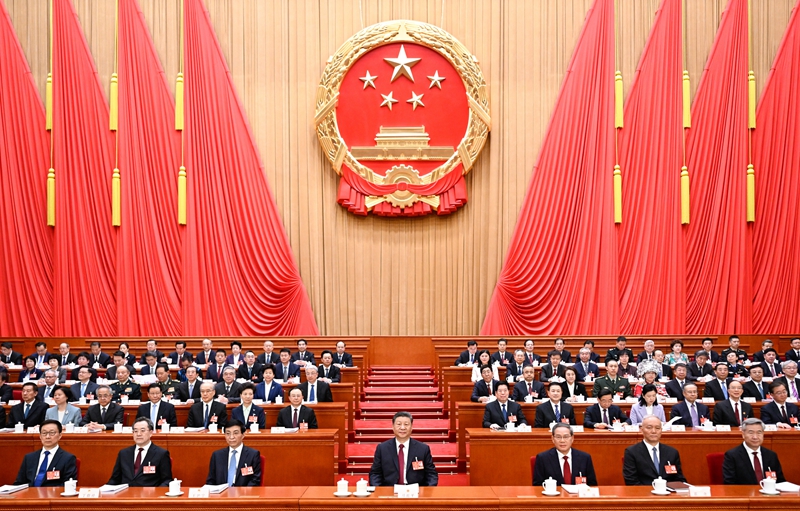During the meetings, typically held in early March, discussions surrounding key economic and social policies and other news related to the sessions dominate social media platforms like Weibo. This intersection of high-level policy discussions and grassroots engagement makes the Two Sessions a focal point for understanding contemporary China.
A focus of the Two Sessions is the Report on the Work of the Government delivered by the premier of the State Council to the NPC. It comprehensively reviews the past year's achievements and challenges and sets out the government's plans and priorities for the coming year. The report is deliberated and adopted at the annual sessions.
This year, the Two Sessions ran in Beijing from March 4 to 11.
Pro-growth policies
This year's government work report was delivered by Premier Li Qiang at the opening meeting of the Third Session of the 14th NPC on March 5. The country's economic performance was mentioned at the top of the report. The report said that in 2024, China's gross domestic product (GDP) rose to 134.9 trillion yuan ( $18 trillion), a year-on-year increase of 5 percent. This growth can be attributed to a series of macroeconomic measures implemented to counteract economic downturn pressures. As a result, China remains one of the world's fastest-growing major economies, contributing about 30 percent to global economic growth.
Looking ahead, the Chinese Government has set the economic growth target at around 5 percent for 2025, according to the report. The report also outlines several other key development goals for the year, including a surveyed urban unemployment rate of approximately 5.5 percent, the creation of over 12 million new urban jobs, and a roughly 2-percent increase in the consumer price index, an important gauge of inflation and deflation.
Huang Qunhui, a national political advisor from the Institute of Economics of the Chinese Academy of Social Sciences, emphasized the importance of this growth target, describing it as grounded and realistic. In a recent interview with Xinhua News Agency, he noted that, in the face of a challenging global environment, such a proactive and resilient approach reflects China's determination to navigate uncertainty while pursuing sustainable growth.
As 2025 is the final year of China's 14th Five-Year Plan (2021-25), this is a pivotal time for formulating the next five-year blueprint. The government seeks not only growth in the short term but also long-term modernization.
The five-year plans, initiated in the 1950s, have served as a central mechanism for guiding China through economic fluctuations and external challenges. They have played an important role in fostering social and economic development and enhancing the nation's strength.
To achieve its growth target, China will roll out more targeted policies to stimulate economic activity. At the Central Economic Work Conference last December, outlining the economic priorities for the 12 months ahead, policymakers pledged to roll out more proactive macro policies in 2025. Boosting consumption was at the forefront of the nine key objectives defined at the meeting. This reflects China's emphasis on domestic demand as a top economic priority.
The 2025 government work report stated China will launch special initiatives to boost consumption in 2025, including issuing ultra-long special treasury bonds of 300 billion yuan ($42 billion) to support consumer goods trade-in programs.
In March 2024, the country unveiled a national program aimed at promoting consumer goods trade-ins. Official data showed that as of late 2024, over 30 million participants had been attracted to the program, contributing total sales of more than 1.3 trillion yuan ($179 billion), and thereby demonstrating the untapped opportunities of China's domestic demand.
In addition to adopting measures to increase spending power, the country will "promote personal income growth through a variety of avenues, increase the earnings of low- and middle-income groups and reduce their financial burdens, and improve the mechanisms for regular pay increases," according to the government report.
China is set to expand effective investment, emphasizing alignment with national development strategies and the needs of its populace. This year, the Central Government budget will allocate 735 billion yuan ($101 billion) for investment purposes. The government report emphasized the importance of carefully selecting projects and managing funds efficiently to ensure ongoing projects receive necessary funding while preventing ineffective investment.
Another key focus for the year will be the development of new quality productive forces, tailored to local conditions, and the acceleration of a modernized industrial system. First introduced in 2023, new quality productive forces represent a shift away from traditional economic growth models. They prioritize hi-tech, high-efficiency productivity, aligning with China's new high-quality development philosophy.
To achieve these goals, emerging industries and those of the future, including biomanufacturing, quantum technology, embodied artificial intelligence (AI), and 6G technology, will see further development. At the same time, traditional industries will be transformed and upgraded to enhance their competitiveness.
Furthermore, the potential of the digital economy will be further unleashed. For example, the extensive application of large-scale AI models will be supported and new-generation intelligent terminals and smart manufacturing equipment will enjoy dynamic development, including intelligent connected new-energy vehicles, AI-enabled phones and computers, and intelligent robots. New-energy vehicles refer to vehicles completely or mainly driven by new energy sources, including battery electric vehicles, plug-in hybrid vehicles, and fuel-cell vehicles.

Lou Qinjian (center podium), spokesperson for the Third Session of the 14th NPC, attends a press conference in Beijing on March 4 (WEI YAO)
People-oriented
At the heart of the discussions at the Two Sessions is the commitment to enhancing quality of life for all residents, particularly in areas such as education, healthcare and social security. The government recognizes that a thriving economy must be complemented by robust social infrastructure to support the wellbeing of the nation's 1.4 billion people. The government work report dedicated a substantial portion to policies to improve people's livelihoods.
Soon after Li had delivered the report, the initiative to provide childcare subsidies, aimed at boosting birth rates, became a top trending topic on social media.
According to the National Bureau of Statistics, China experienced a turnaround in 2024, reporting increases in both the number of newborns and the birth rate after seven consecutive years of decline. This trend has been largely supported by a series of birth-friendly policies to encourage family growth.
In 2015, China ended its decades-long one-child policy, granting all couples the right to have two children. In 2021, this policy was further expanded to allow families to have a third child. Subsequently, central and local governments introduced supportive measures to build a more childbirth-friendly society. These measures included expanding childcare systems and strengthening education, housing, and employment support.
Providing childcare subsidies has captured widespread attention as part of broader efforts to encourage family growth and alleviate the financial burden associated with childcare.
Moreover, the government work report also mentioned "promoting free preschool education" as part of the efforts to upgrade basic education and develop sound mechanisms for coordinating the allocation of educational resources.
During an interview following the NPC's opening meeting, Chinese Minister of Education Huai Jinpeng emphasized the importance of integrating childbirth, parenting and education. He said these efforts intend to provide greater benefits for families and effectively prepare the education system to nurture high-quality talent for the country. He also noted that a law on preschool education will take effect on June 1. This is a big step forward in supporting early childhood education in China. This law is expected to enhance educational opportunities for young children and strengthen the overall education framework.
In 2025, employment continues to be a primary concern for the public. "Employment is crucial to the people's wellbeing. Keeping this in mind, we will further refine the employment-first policy and make better use of various types of funds and resources to provide stronger support," the work report read. It emphasized the importance of leveraging relevant initiatives, such as unemployment insurance premium refunds, tax and fee reductions, and employment subsidies, to promote full and high-quality employment. Additionally, the report highlighted plans to expand employment and business startup opportunities for college graduates and other young people, while also assisting ex-service members in their resettlement and job placement efforts.
Mo Rong, CPPCC National Committee member and President of the Chinese Academy of Labor and Social Security, believes the series of measures aimed at stabilizing employment in the report are a new response to the current employment situation and the changing dynamics in the employment sector. The shifts in labor demand due to economic transformation and upgrading have accelerated adjustments in the country's employment structure.

Customers apply for a trade-in subsidy from the government in Fuyang, Hangzhou, Zhejiang Province, on October 31, 2024 (XINHUA)
Voices heard
NPC deputies come from all segments of society, including many front-line workers and farmers, ensuring grassroots representation. With China being home to 56 ethnic groups, even the smallest ethnic group is guaranteed at least one representative. Meanwhile, CPPCC National Committee members include officials and prominent figures such as scientists, educators, and entrepreneurs.
Every year during the Two Sessions, deputies to the NPC and members of the CPPCC National Committee gather to discuss critical issues affecting the country and its citizens. When not attending the sessions, they reach out to the people for suggestions and conduct field research on important or urgent issues. These can range from local development issues to challenges people may face in their daily lives. The deputies and members collect opinions and suggestions from the public and submitted them to the related departments.
According to the State Council Information Office, in 2024, government departments reviewed and acted on 8,783 suggestions from NPC deputies and 4,813 proposals from CPPCC National Committee members. Over 5,000 recommendations were adopted by different government departments, culminating in more than 2,000 policy measures that tackled major economic and social issues. BR
(Print Edition Title: A Symphony of Voices)



















